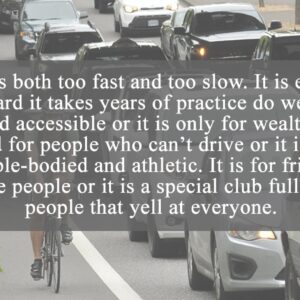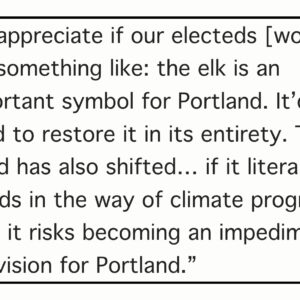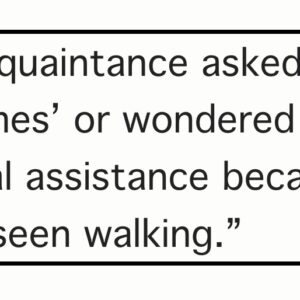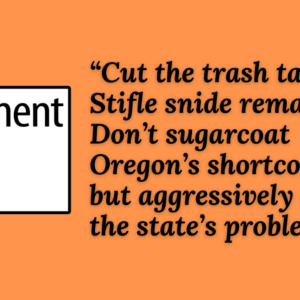“The idea that Portland, a city that produces little and consumes like a drunken sailor, should base its emission targets on the ‘production’ metrics used in the above report is pure bull feces.”

Welcome to the Comment of the Week, where we highlight notable comments. You can help us choose our next one by replying with “comment of the week” to any comment you deem worthy.
This week we highlight a comment by prolific post pundit “Soren.” Do you need a moment, regular readers, to let that sink in?
We chose this comment because it speaks to inconvenient truths about our carbon impact, and the breadth of change we need to make to reduce our footprint.
Soren critiques the Multnomah County climate change report. His point is that a significant portion of our contribution to greenhouse gasses (GHG) is not our direct GHG release, but rather the GHG released in all the places around the world that produce what we consume—and that we consume a lot. This is a “demand-side” argument which the Intergovernmental Panel on Climate Change (IPCC) addressed for the first time in their sixth assessment report, released in February.
His comment kicked off an interesting thread. If you are someone for whom policy goes down easier with a little blood on the floor, this one is for you.
Advertisement
Toward the end, commenter “Steve C” directly asked Soren to describe in his own words what local policies he would recommend to promote reduced consumption. That prompted an excellent summary from Soren of the IPCC demand-side recommendations. If you are not someone who is going to read chapter 5, or Soren’s recommended summary of the full report, you could do worse than read a summary from Soren himself.
Soren wrote:
I try very hard not to talk about policy in my “own words” when it comes to the climate crisis so the policies I would like to see implemented are just rewordings of the IPCC scientific consensus and also informed by the scientific publications I’ve read.
In no particular order:
1. Some of the lowest hanging fruit would be to conserve energy by switching to energy efficient electric heating/cooling systems or appliances and incentivize (mandate) energy efficiency infrastructure, such as, high-quality insulation/windows. This is already becoming the default in other less oligarchical developed nations.
2. Creation of policy and strong incentives/disincentives that cajole Portlanders to sharply reduce their consumption of meat, dairy, and rice (or switch to dryland rice). This would have an immense impact on agriculture-associated consumption-based emissions, most of which occur outside of urban areas. (Most Portlanders don’t realize that the US imports an awful lot beef grown on clear cut land in Brazil, for example.) I personally would advocate for taxes on high-embedded carbon foods that would be used to subsidize better food choices and access to nutrition. (In the long-term we should turn to technology that dramatically reduces the land footprint of our food growing systems so that more land can be used for accelerated carbon capture.)
Advertisement
3. A somewhat more difficult set of policies would be to disincentivize the absurdly high levels of goods consumption (electronics, clothing, appliances, other stuff etc) in Portland and other very-high-income cities. A VAT-like system that taxes the embedded carbon of imported/shipped goods is one mechanism (European nations are pursuing this). Another mechanism would be to regulate and/or disincentivize rapid “warehouse to door” delivery of online goods. The negative externalities of online shopping and hypermarkets could also be mitigated via anti-trust actions by government. Cities like Portland could also disincentivize “hypermarkets” and disincentivize rapid warehouse-to-door deliveries with local laws.
4. Recycling in Portland and the USA has seen steep declines as a result of a nation-wide move towards mixed recycling and a societal de-emphasis of conservation. For example, much of Portland’s plastic recycling has gone to the landfill in recent years and we still use an awful lot of disposable plastic that has no recycling market (e.g. anything above 3). Governments should ban disposable and non-readily recycled materials. We need a system that incentivizes consumers to recycle and manufacturers to create recycling systems. For example industry should be charged steep fees if their products are not recycled and consumers should be charged bottle bill-like-fees for most items that do not have long life-spans (this should include electronic items).
5. Right to repair, right to receive “updates”, government mandated energy efficiency, and government-mandated longevity standards for all consumables, including electronics. Ideally we would create a system where items could be easily repaired by consumers- see the framework laptop for one example: https://frame.work/.
Advertisement
6. Existing buildings should be upgraded to low- or zero-carbon standards via a mix of government-based incentives, credits, and regulations. All new buildings should have to conform to government-mandated low or zero-carbon standards. (Existing low- or zero-carbon commercial certifications are unregulated and are often nothing more than greenwashing.)
7. The cost of driving low-occupancy vehicles in urban areas should be dramatically-increased in a manner that is sensitive to deeply unequal access to non-automobile transportation options. We should also ban or sharply limit use of low-occupancy vehicles in large swathes of dense urban centers (with equitable access for people who live in less dense areas — there are many ways to do this). I am personally agnostic about how de-automobilization happens and there are definitely scenarios where there isn’t much of an increase in people riding bikes.
8. All transportation should be rapidly electrified — none of this waiting for better BEV bullshit when it comes to mass transit. Trains can be electrified now — and so can most urban bus lines. Transportation that remains carbon intensive should be strongly disincentivized/regulated (e.g. air travel).
Note: I intentionally did not discuss decarbonizing energy generation because we all know what needs to happen – renewables, storage, and nuclear only as a transition to a decarbonized grid. (I don’t think a rapid transition is possible under the current capitalist utility system in the USA.)
Thank you Soren.







Thanks for reading.
BikePortland has served this community with independent community journalism since 2005. We rely on subscriptions from readers like you to survive. Your financial support is vital in keeping this valuable resource alive and well.
Please subscribe today to strengthen and expand our work.
Thank you for acknowledging Soren and bringing his comments to our attention. We should all thank Soren for sharing his understanding and experience in the comments section of Bike Portland.
Thank you Soren!
Janos
Great post and summary. IMO most of these that can be done on a personal level aren’t all that difficult and there is actually a massive financial incentive to implement some of them. For example, if you’re vegan you aren’t being hit nearly as hard by inflation.
If you can go without owning a car you can save on avg ~$6500 a year if you were driving a small sedan. The opportunity cost of that car money if instead invested in a retirement acct could be retiring years or even decades early.
Buying fewer, higher quality things will allow for a smaller home with less clutter, saving on heating/cooling, and (at least for me), allowing a clearer headspace.
I agree that there are things one can do, and that that’s useful — I’m vegetarian (vegan is still a goal), don’t own a car, try to shop locally and repair what I can.
But the capitalist approach to environmentalism always focuses on these individual actions, because they externalize the costs of rampant ecological devastation on consumers rather than manufacturers. No need to use much-more-reusable glass containers; convince everyone that the plastic Coke bottle will be “recycled”; no need to shut down or regulate coal plants, call on people to opt-in to renewable energy; no need to ban internal combustion engines, just sell fancy $80k electric sports cars.
So while I agree with you that things “can be done on a personal level [that] aren’t all that difficult” I think the clear trajectory of the last few decades is that individual behavior modification doesn’t cut it. If we’re going to mitigate the ongoing climate disasters then we need some things to simply be impossible, illegal or so economically ruinous for producers that they don’t get produced in the first place.
I agree individual behavior hasn’t produced the desired outcome and real regulation is needed. It’s sad that this regulation doesn’t seem to be happening now or in the near future. I also think more people would reconsider if they new they could be putting their car money to a much better use. I’m sure at least some of the average small car drivers would be willing to give that up for a projected $300k+ after 25 years?
Individual actions are obviously insufficient but this fact is also sometimes used to avoid discussion of how it’s not only industry that has to be transformed but also our current ways of living (shared socioeconomic pathways in IPCC jargon).
When you figure in the taxes on that $6500 sedan you’ve realized maybe 2/3’s to 3/4’s of my 401(k) contribution is because I’m car free.
If you live in a 750sqft apt with a woman who has hot flashes you get to see what your energy bill can be when you almost never turn on the heat (a well insulated apartment with only 2 external walls rarely drops below 60 degrees) (it is necessary to have a fleece blanket handy when the inside temps drop to 60, however).
As a 55 year old who wants to remain active and healthy, I’ve already cut my meat consumption to 8-12oz/week (4oz “red” meat, 4-8oz free range chicken or wild caught fish). Not only does that help my body, but I get out of the grocery store way cheaper than when I used to eat more meat.
I do try to minimize delivery trips to my home (get them delivered to work with our daily UPS truck or use a locker) – the problem is I literally don’t know where to get some of the goods I need without going online (for instance 7 speed chains & cassettes are not going to be found at a local bike shop AFAICT, also, how do I get good vegan protein bars without having them delivered?)
Of course, having tried to be conscious of my impact over the last 35 car free years, deliberately living in smaller spaces and not being part of the “Oh, my phone is a year old, I need a new one” crowd – I look around and wonder why I bothered when so few other people seem to care. Heck, I don’t even have kids to pass a better world onto.
I had lunch with vendor rep I’ve known for 12 years the other day. He was gushing about how much he loved his 3 year old daughter. But when discussion turned to the environment, the fact that he and his wife own and drive 2 SUV’s he was absolutely shocked when I told him I didn’t buy that he actually cared a whit for his daughter (and got very defensive).
If I only lived this way to benefit the rest of the world, I’d probably just say screw it. The fact is, I *like* my lifestyle (much to the shock of people who live a more traditional American “dream” lifestyle).
But why do you like it?
For me it’s not about “identity” — and definitely not about perfection — but about keeping my idealism alive.
I like riding – Sun, Rain, Cold Rain, Snow. I get to work and I’m energized and happy.
I like having a small place to live in – it forces one not to collect too much stuff (something I struggle with :)) and is so much easier and faster to clean.
I grew up on a farm – mowing an acre’s worth of lawn, cleaning horse, sheep and dog crap up out of paddocks daily and the like were part of growing up. Now – I don’t want no stinkin’ yard to take care of 🙂
I like being able to service my transportation and not being dependent on something I can’t fix if it breaks.
And yes – as cranky as I get looking around I do like to look around at my life and say – “I didn’t cave on something I believed in”.
Your 7-speed chains and cassettes may have been unobtainable (along with loads of other components) at the peak of the pandemic bike boom, but they’re back on shelves now and have been for a few months (at the shop where I work, anyway).
That town bike gets about 2k miles per year, so I’ll probably need new ones again in late 2023.
I appreciate Soren’s marshaling of interesting and important facts about climate change and the human activities causing it. However, when he includes off-the-wall comments like this (from a recent BikePortland comment):
I am left wondering about his thought processes.
As member #39 of 1000 Friends of Oregon, I know how it came into existence, why, and by whom. Certainly a big reason was the need to preserve farm and forest lands from development. The assumption was that farm and forest zoning, combined with more efficient urban development, would be major tools for doing so. Thus Oregon’s statewide land-use planning system was created by the Oregon Legislature. 1000 Friends was formed as a watch-dog to ensure that entrenched economic interests would not subvert this system.
Certainly reasonable people can have different perspectives about urban development, and of course attitudes can change, as can our understanding of the world. But it seems counter-productive to demonize people who are honestly working for a better world, when you could be providing understandable critiques of their approaches.
Oregon’s statewide land use system was created to protect farm and forest land. It was not created to support urban areas or give voice to urban residents.
Right now we are receiving “blowback” from the general public because of of the homeless camps on transport corridors. I feet guilt tripped and bamboozled into being an affordable housing advocate. “Housing is more important”, yeah right.
All that money went to paying for staffers and programs and we still have homeless camps. If they would have spent that money on market rate rents instead of staffers we would not be on the receiving end of the blow back. Housing first? More like staffers, non profits and research institutes first.
The donor-funded non-profit industrial complex is almost always an enabler of the dehumanizing status quo and according to my political opinion 1000 Friends is a perfect example of this.
To question my “thought processes” because I view the organization that someone supports as a (BAU) enabler of our ever worsening housing status quo is the epitome of “ad hominem”.
This has all too often been my experience with multi-millionaire-donor-funded nonprofits. If someone has a political critique of their orientation, the immediate assumption is that that person is either “loony” and/or acting in bad faith.
Most intra urban trains are already electrified, e.g. Portland’s MAX, and metros in most major international cities incl. NYC, Paris, London, etc. Inter urban trains like Amtrak may or may not be electrified.
Thanks for the correction. I was thinking about freight in a addition to transportation (electrified rail could compete better with trucking). I was also thinking about the dense web of interurban trains in Europe that function as basic urban/interurban transportation (informed by my childhood experiences in Romania and Spain).